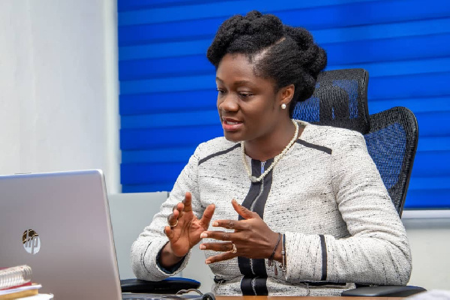A whopping 60 percent of the 800,000 applicants for the GH¢600 million Coronavirus Alleviation Programme (CAP) for small businesses affected by the pandemic did not have bank accounts, National Board for Small Scale Industries (NBSSI) – the body tasked with disbursing the fund, has revealed.
NBSSI’s Executive Director, Kosi Yankey-Ayeh who disclosed this, said the majority of applicants, particularly the female ones, resorted to using their husbands and family members’ bank or mobile money accounts. This, she added, led to a number of them not receiving their funds because their personal and bank details did not match.
“They are instances when we have paid 10,000 applicants but 6,000 came back as failed because of wrong bank accounts; they are using their brothers’ and husbands’ accounts. And this comes back to the fact that a lot of us are not banked,” she lamented.
She was speaking at the annual general meeting of the Greater Accra branch of the Association of Ghana Industries (AGI), and noted that the problem is common throughout the country, including the capital, Accra.
This revelation flies in the face of renewed commitment over the past few years to promote financial inclusion through the use of innovation and technology, including mobile money and mobile banking.
While it paints a grim picture of the poor savings culture in the country, the disclosure also means that a huge number of small businesses are excluded from the numerous benefits of financial inclusion – access to financial services and access to credit to expand, create jobs and reduce inequality, among others.
With the African Continental Free Trade Area (AfCFTA) coming into effect from January 1 2021, however, she said it is appropriate for Micro, Small and Medium Enterprises (MSME) to operate functioning bank accounts in order to be enabled in taking advantage of the free market area.
Mrs. Yankey-Ayeh further noted that the situation implies there is still a lot of work to be done by financial institutions and other stakeholders to ensure that the majority of Ghanaians become financially included.
Manufacturing is the way forward
For his part, the Vice President of AGI, Humphrey Ayim-Darke, said one of the lessons from the COVID-19 pandemic is the need to strengthen local manufacturing capacity.
He added that the imminent operationalisation of the AfCFTA has made it even more imperative to harness full potentials of the local, national and political economy as part of an overarching strategy to become a key player in the continental free market area.
“If these three do not harmonise, we will have disruptions all around and may struggle to achieve the right goals,” Mr. Ayim-Darke noted, further calling for more efforts to help MSMEs access credit to enable them expand and take advantage of the African free trade arrangement.










